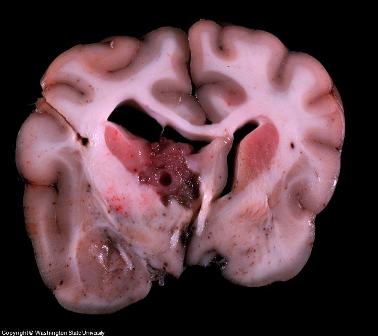Table of Contents
Overview & Breeds | Symptoms & Diagnosis | Treatment & Prognosis
Summary:
"Dog brain tumor symptoms include changes in behavior, intelligence or blindness. Treatment options vary based on the location of the tumor."
Overview
Dog Brain Tumor symptoms are most often seen in older dogs, although they can affect younger dogs. If an older dog has a seizure it could have a brain tumor. The most common tumor types are called astrocytomas, oligodendrogliomas and meningiomas. Tumors or lesions tend to be at multiple sites on the brain. Other causes of canine seizures include low blood sugar or heart problems.
Canine Brain Tumor by Breed
Boxers and Boston Terriers are predisposed to pituitary and glial cell tumors.
Breeds with a long nose such as Doberman Pinschers, Scottish Terriers and Golden Retrievers have a predisposition to meningiomas.
Dog Brain Tumor Symptoms
Canine brain tumor symptoms tend to vary based on where in the brain the tumor is growing. Your dog may not have any symptoms during the beginning of tumor growth with the body adjusting to changes caused by the tumor. When the tumor gets large, the body can no longer adjust, causing symptoms.
Symptoms can include changes in behavior, intelligence or blindness.
Diagnosis of Canine Brain Tumor
Diagnosis of a canine brain tumor requires a MRI or CT (computed tomography) scan. Each test has higher effectiveness at detecting different types of tumors. Tests will include a complete blood chemistry profile and urinalysis to rule out other causes of symptoms. The only way to be certain that a brain tumor exists is to take a biopsy (sample) and then test in the lab.

Treatment of Dog Brain Tumor Symptoms
Brain tumor treatment methods are designed to:
- Control swelling (edema) and pressure on the brain
- Control seizures
Canine Brain tumors can be treated with radiation, chemotherapy or removal through surgery. Removing a canine brain tumor is difficult depending on the location and size of the tumor.
Dogs that are exposed to radiation therapy can live at least a year after treatment. Your veterinarian may also give your dog prednisone (corticosteroid) if there is any brain swelling. Canine seizures are treated with Phenobarbital.
Prognosis of Canine Brain Tumor
Without treatment a dog with a canine brain tumor can survive up to
several months. With treatment, the median survival time is 6 - 10
months. Dogs that are treated with both surgery and radiation live
longer than if only one method is applied, with an expected life span of
up to 16 months.
Sources
Nutrition and Cancer: New Keys for Cure and Control 2003!
Gregory K. Ogilvie, DVM, DACVIM (Internal Medicine & Oncology)
Colorado State University
Ft. Collins, CO, USA
Prostatic Disease in the Dog
Peter E. Holt, BVMS, PhD, ILTM, DECVS, CBiol, FIBiol, FRCVS
Professor of Veterinary Surgery, University of Bristol
Department of Clinical Veterinary Science
Langford, Bristol, UK
Lymphoma
Antony Moore, BVSC Diplomate ACVIM
Director, Veterinary Oncology Consultants
379 Lake Innes Drive
Wauchope NSW 2446
Australia
Canine Brain Tumors: Improvements in Diagnosis and Treatment
R Chun
School of Veterinary Medicine
University of Wisconsin-Madison
Neoplasia of the Nervous System (spinal tumors)
S. Long
School of Veterinary Medicine
University of Pennsylvania
Current Therapy for Canine Oral Tumors
M. Kessler
Tierklinik Hofheim, Germany
Dog Owner's Home Veterinary Handbook
James M. Giffin
Liisa D. Carlson DVM
Hound Health Handbook
Betsy Brevitz, DVM
